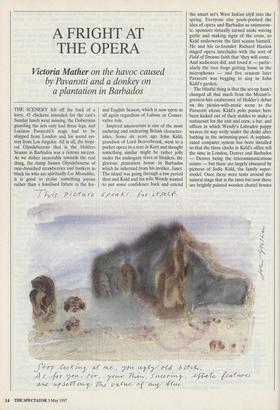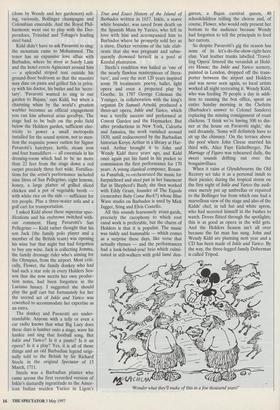A FRIGHT AT THE OPERA
Victoria Mather on the havoc caused by Pavarotti and a donkey on a plantation in Barbados THE SCENERY fell off the back of a lorry, 45 chickens intended for the cast's Sunday lunch went missing, the Doberman guarding the sets only had three legs, and Luciano Pavarotti's stage had to be shipped from London and his sound sys- tem from Los Angeles. All in all, the tropi- cal Glyndebourne that is the Holders Season in Barbados was a riotous success. As we slither inexorably towards the real thing, the damp Sussex Glyndebourne of rain-drenched strawberries and bankers in black tie who are spiritually Les Miserables, it is good to praise something joyous rather than a fossilised fixture in the for- mal English Season, which is now upon us all again regardless of Labour or Conser- vative rule.
Inspired amateurism is one of the most enduring and endearing British character- istics. Some six years ago John Kidd, grandson of Lord Beaverbrook, went to a pocket opera in a tent in Kent and thought something similar might be rather jolly under the mahogany trees at Holders, the glorious plantation house in Barbados which he inherited from his mother, Janet. The island was going through a low period then and Kidd and his wife Wendy wanted to put some confidence back and extend the smart set's West Indian idyll into the spring. Everyone else pooh-poohed the idea of opera and Barbados as oxymoron- ic, sponsors virtually turned aside waving garlic and making signs of the cross, so Kidd underwrote the first season himself. He and his co-founder Richard Hanlon staged opera interludes with the sort of Field of Dreams faith that 'they will come'. And audiences did, and loved it — partic- ularly the tree frogs getting loose in the microphones — and five seasons later Pavarotti was begging to sing in John Kidd's garden.
The blissful thing is that the set-up hasn't changed all that much from the Mozart's- greatest-hits exuberance of Holder's debut on the picnics-with-music scene to the Pavarotti circus. Kidd's polo ponies have been kicked out of their stables to make a restaurant for the cast and crew, a bar, and offices in which Wendy's Labrador puppy weaves its way wetly under the desks after bathing in the swimming-pool. A sophisti- cated computer system has been installed so that the three clocks in Kidd's office tell the time in London, Denver and Barbados — Denver being the telecommunications centre — but these are largely obscured by pictures of Jodie Kidd, the family super- model. Once there were tents around the natural stage that is the lawn but now these are brightly painted wooden chattel houses (done by Wendy and her gardeners) sell- ing, variously, Bollinger champagne and Colombian emeralds. And the Royal Phil- harmonic went out to play with the Des- peradoes, Trinidad and Tobago's leading steel band.
Kidd didn't have to ask Pavarotti to sing: the mountain came to Mohammed. The tenor has an expansive love affair with Barbados, where he stays at Sandy Lane and the hotel erects Agincourt around him — a splendid striped tent outside his ground-floor bedroom so that the maestro may dine on pasta and grilled fish in priva- cy with his doctor, his butler and his 'secre- tary'. 'Pavarotti wanted to sing in our garden to Bajans,' says Kidd, but when a charming whim by the world's greatest warbler becomes an official engagement you can kiss arboreal arias goodbye. The stage had to be built on the polo field below the Holders garden, sufficient elec- tricity to power a small metropolis installed for the sound system, not to men- tion the requisite power outlets for Signor Pavarotti's hairdryer, kettle, steam iron and four humidifiers — all essentials in his dressing-room which had to be no more than 22 feet from the stage down a red carpet precisely three feet wide. Fortifica- tions for the artist's performance included nine litres of San Pellegrino, eight lemons, honey, a large platter of grilled sliced chicken and a pot of vegetable broth with white rice on the side — sufficient for ten people. Plus a three-seater sofa and a golf cart for transportation.
I asked Kidd about these superstar spec- ifications and his eyebrows twitched with- out comment. Hang Pavarotti's San Pellegrino — Kidd rather thought that his son Jack (the family polo player and a member of the British team) was opening his wine bar that night but had forgotten to buy any wine. Jack is collecting Jemma, the family dressage rider who's aiming for the Olympics, from the airport. Most criti- cally, Flower, the family donkey who had had such a star role in every Holders Sea- son that she now merits her own produc- tion notes, had been forgotten in the Luciano lunacy. I suggested she should play the golf cart but fortunately for her the second act of Inkle and Yarico was reworked to accommodate her expertise as an extra.
The donkey and Pavarotti are under- standable. Anyone with a telly or even a car radio knows that what Big Lucy does these days is lumber onto a stage, wave his hankie and sing that football song. But Inkle and Yarico? Is it a panto? Is it an opera? Is it a play? Yes, it is all of those things and an old Barbadian legend origi- nally told to the British by Sir Richard Steele in the original Spectator of 13 March, 1711.
Steele was a Barbadian planter who came across the first recorded version of 'tilde's dastardly ingratitude to the Amer- ican Indian maiden Yarico in Ligon's True and Exact History of the Island of Barbados written in 1657. Inkle, a suave white bounder, was saved from death on the Spanish Main by Yarico, who fell in love with him and accompanied him to Barbados where he promptly sold her as a slave. Darker versions of the tale elab- orate that she was pregnant and subse- quently drowned herself in a pool at Kendal plantation.
Steele's rendition was hailed as 'one of the nearly flawless masterpieces of litera- ture', and over the next 120 years inspired some 50 treatments: poetry, ballet, light opera and even a projected play by Goethe. In 1787 George Coleman the Younger, in collaboration with the king's organist Dr Samuel Arnold, produced a three-act opera, Inkle and Yarico, which was a terrific success and performed at Covent Garden and the Haymarket. But after productions in New York, Calcutta and Jamaica, the work vanished around 1830, until rediscovered by the Barbadian historian Kevyn Arthur in a library at Har- vard. Arthur brought it to John and Wendy Kidd three years ago, and Kidd once again put his hand in his pocket to commission the first performance for 170 years. A young classical composer, Roxan- na Panufnik, re-orchestrated the music for harpsichord and steel pan in her basement flat in Shepherd's Bush; she then worked with Eddy Grant, founder of The Equals (remember Baby Come Back?) whose Blue Wave studio on Barbados is used by Mick Jagger, Sting and Elvis Costello.
All this sounds fearsomely avant-garde, precisely the cacophony to which root canal work is preferable, but the charm of Holders is that it is populist. The music was tinkly and hummable — which comes as a surprise these days, like verse that actually rhymes — and the performances had a look-behind-you! brio which culmi- nated in stilt-walkers with gold lame dun- garees, a Bajan carnival queen, 40 schoolchildren trilling the chorus and, of course, Flower, who would only present her bottom to the audience because Wendy had forgotten to tell the principals to feed her carrots.
So despite Pavarotti's gig the season has none of its let's-do-the-show-right-here elan. Vast leather trunks labelled 'Travel- ling Opera' littered the verandah at Hold- ers House; the Inkle and Yarico scenery, painted in London, dropped off the trans- porter between the airport and Holders and was never seen again, so local artists worked all night recreating it. Wendy Kidd, who was feeding 70 people a day in addi- tion to running the box office, spent an entire Sunday morning in the Chefette (Barbados's answer to Colonel Sanders) replacing the missing consignment of roast chickens. 'I think we're having 500 to din- ner at the house on Pavarotti night,' she said dreamily. 'Some will definitely have to sit up the chimney.' On the terrace above the pool where John Cleese married his third wife, Alice Faye Eichelberger, The Marriage of Figaro was rehearsed daily, the sweet sounds drifting out over the bougainvillaea.
When it rains at Glyndeboume the Old Rectory set take it as a personal insult to their picnics; during the tropical storm on the first night of Inkle and Yarico the audi- ence merely put up umbrellas or repaired to the Bollinger bar from which one had a marvellous view of the stage and also of the Kidds' chef, in tall hat and white apron, who had secreted himself in the bushes to watch. Doves flitted through the spotlights; this is as good as opera in the wild gets. And the Holders Season isn't all over because the fat man has sung. John and Wendy Kidd are planning next year and a CD has been made of Inkle and Yarico. By the way, the three-legged family Doberman is called Tripod.
`Wonder what they'll make of this in a few thousand years!'



































































 Previous page
Previous page